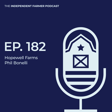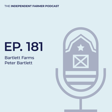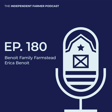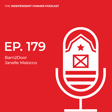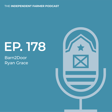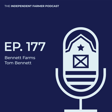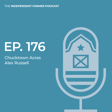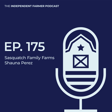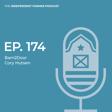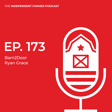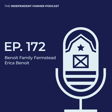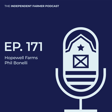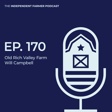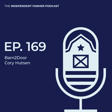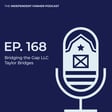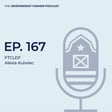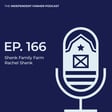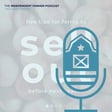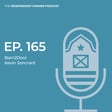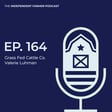Become a Creator today!Start creating today - Share your story with the world!
Start for free
00:00:00
00:00:01

Farmer Spotlight: Yoder-Way Farm
In this week's episode, Janelle and Lois of Yoder-Way Farm discuss the transition from commercial dairy to direct beef sales. Lois explains how she builds her community through marketing on social media and through newsletters, as well as securing recurring revenue.
For more Farm resources: https://www.barn2door.com/resources
Transcript
Introduction to The Independent Farmer Podcast
00:00:10
Speaker
Hello and welcome to the Independent Farmer Podcast, the go-to podcast for do-it-yourself farmers who are taking control of their own business, skipping the middleman, and selling direct to local consumer and wholesale buyers. This podcast is hosted by Barn to Door, the number one business tool for independent farmers to manage their business, promote their brand, and sell online and in person. Let's dive in to today's Independent Farmer Podcast.
00:00:42
Speaker
Welcome to the Independent Farmer podcast.
Transition to Regenerative Farming
00:00:44
Speaker
I'm Janelle, CEO of Barn to Door and your host for today's episode. As many of our listeners are aware, Barn to Door helps independent farmers promote their brand, manage sales online and in person and streamline their business operations. In today's conversation, we're talking to Lois of Yoder Way Farm in Pennsylvania.
00:01:02
Speaker
Their farm started as a commercial dairy and moved into regenerative farming in 2021. Using Burns Door, Yoder Way sells direct to their community. Today, I'm happy to welcome Lois. We will learn about Yoder Way Farm, their success in Pennsylvania, and their goals for the future. Welcome.
00:01:19
Speaker
Thank you. Glad to be here. Very glad. It's so wonderful to learn more. Love that you're in Pennsylvania. We have a lot of farms in Pennsylvania, honestly, as well as around the country. So hopefully all of them will listen to this as well. But what I really want to unpack today is you made a very big transition.
00:01:35
Speaker
Which I think is of interest because I think there's a lot of farms out there either considering this, but not knowing if you can kind of come out the other side and you've done that successfully. So wonderful to unpack that. So let's just back up a little bit. Tell us a little bit about your farm, how long you've been farming and sort of where it started. So my husband and I are the third generation in his family to live on this farm.
00:02:00
Speaker
His grandparents and his parents moved to the farm in the late 70s and had a commercial dairy operation. That continued until 2019. We sold the commercial dairy herd. Commercial dairy was just no longer a viable option for our farm going forward. We were landlocked as far as expanding. Plus we were noticing the health of our cows with pushing them to produce so much.
00:02:31
Speaker
their health was deteriorating and we just decided we needed to go a different direction. So we sold the commercial dairy and my husband got a full-time job and we were left wondering exactly what we're going to do with this farm. That's a good question. Yes.
00:02:53
Speaker
We did get a few beef cows in and we soon had family and friends asking us if they could buy beef from us. And so we said, sure. So we just kind of started doing that halves and quarters. And then we had another friend that grew up on a local farm here. He started a creamery processing his family's milk on farm and was wildly successful. And he told us, get inspected.
00:03:21
Speaker
Start yourself a little farm store on your farm, sell your beef out of a freezer on your farm, individual cuts. And we were like, okay, great idea. We're gonna jump in and do this.
Establishing a Farm Store
00:03:32
Speaker
So we did, we opened, we got our retail license, the end of 2020. And so it was really in January of 2021 where we stopped our freezer for the first time with individual cuts of meat. And yeah, told our friends and family, come shop the freezer.
00:03:51
Speaker
Wow. Wow. And what is the size today of your operation? So we still have our little farm store in the garage. We live in a ginormous red brick farmhouse, two car garage that we've converted into our farm store. Okay. And yeah, we butcher two beef and three pigs every month. but That's kind of the volume of animals that we're doing right now. And yeah, we just keep trying to Shout from the rooftops and get word of mouth out. But we've built a great base of customers. yeah We have these solid regulars that come back every time.
00:04:30
Speaker
And they are our best form of advertisement. Yeah, I love that. I think it's good just to be aware of that. Your current customers enjoying your farm product, of course, with all the nutritional value and just the locally produced and the taste, obviously we all know that's going to be better than somewhere where they're purchasing brick and mortar. That really inspires them to share with others.
00:04:54
Speaker
Yes, absolutely. We hear that all the time. Yeah. Just a regular customer came back just the other day and he said, I've not been to the grocery store since the first of the year when I started coming to your farm. He said, I just can't go back to buying that grocery store. No, you can't. You become like a farm snob. At least I'm one too, right? Yeah. but Like, no, I'm not going to, no, I only buy my meat from farmers.
00:05:17
Speaker
And so if you're walking through a grocery store, you're just like, nope. And you just kind of get to skip whole sections of the grocery store, which frankly feels amazing as a buyer and eater, right? As a receiver of all that great product. So backing up again,
Challenges with Commodity Pricing
00:05:31
Speaker
so you were in dairy. What was the pricing situation like? Were you subject to commodity pricing? Did you have a single contract? Like what was that experience? And is that some of the reason why it was hard to be successful?
00:05:45
Speaker
Yes, absolutely. Not being able to set our own price for our product based on our input costs was absolutely the reason that we sold the dairy cows. We did have a single contract. It was with Land O'Lakes, but the price of milk, it just went up and down all the time. And the regulations kept changing. They kept making new requirements for our herd size and the amount of milk that we could ship.
00:06:13
Speaker
So, you know, some years we could ship X amount. The next year it was fewer gallons of milk we were allowed to ship. So it was very hard to make good sound financial decisions. yeah Everything was changing all the time. The only thing that did not change was the fact that our input costs kept going up. yeah That was a constant.
00:06:35
Speaker
so I told Jeremy, I did not come from a farming background at all. My family was not into agriculture. And so I was asking my husband, Jeremy, lots of questions all the time. And his standard answer was, well, it's just how farming is. I mean, what else do you do? And after a while though, we started having some very hard conversations and we're like, if we want to keep our farm This is not the sustainable way to keep it. We're going to have to do something else. That's a hard conversation, but also very productive conversation. Absolutely. Yeah. Yeah. Wow. So you sold the dairy cows and then you said a fellow farmer was having success doing a sort of small batch sell direct dairy and he was the one who encouraged you.
00:07:22
Speaker
Yes. open your own Okay. um Okay. And so I presume if he's having wild success, he was doing the same thing. He was selling direct setting his own prices. And that's why he was able to have success. And yet you were already onto the beef. Yes, that's correct. We had decided the process of putting it on farm creamery onto the farm here was going to be too rigorous for us to pursue as far as the equipment, the testing, everything that needed to be done.
00:07:51
Speaker
Yeah, beef seemed easier. So yeah, we went the beef route. And Jeremy, he had his full time job, which we needed for our financial support at the time since all of a sudden the dairy cows were gone. Yes. Okay, that makes perfect sense. So you really needed to be cautious about the transition and the time that you had available as a resource. Yes.
Diversifying Farm Products
00:08:13
Speaker
Okay. And you're selling not just cows, correct? You mentioned pigs. Is there anything else that you're currently selling?
00:08:18
Speaker
We do beef, pork, and chicken, and we also do eggs. We have some laying hens here, and we have a few turkeys we're doing for Thanksgiving as well. Yeah, because they're entertaining. because Yeah, very. turkey yeah And they have such the personalities, don't they? Oh my goodness. Oh, they do. Yes. They are unique in their own way.
00:08:40
Speaker
Yes, I love it. I love it. Okay, so you really do have mixed proteins, which is wonderful. Are you selling any of those with subscriptions? Are there any of those in particular that are more or less successful? I mean, any tidbits on folks who are considering a mixed situation of which many do?
00:08:58
Speaker
Yes, we do use subscriptions quite a bit, and okay which is something that we learned through Bar to Door. I will never forget the podcast I was listening to. I think Will and Amy were on from Old Ridge Valley. And they were discussing their herd shares. And it was like a light bulb went off in my head. And so Jeremy and I got our got our heads together. And we figured it out how it would work for us to offer subscriptions.
00:09:25
Speaker
And it has been a huge blessing for us. It brings in that base of financial support that we need each month in our farm business here. So yeah, we do offer beef subscriptions and pork subscriptions. At this point, we are not offering any chicken subscription. Chicken is the newest thing we have added here to the farm. So we're still working our way through that. It has been very successful for us this summer.
00:09:54
Speaker
And I'm hoping by next summer, we might have a chicken subscription in place, but at this point we do not. I would say we have the most of the beef subscriptions and folks really love that herd share model where they can get a portion for a year, a portion each month for a year. That just seems to work the best for many people. And it works great for us too. It helps us to control our inventory.
00:10:21
Speaker
We don't need to have huge stockpiles of inventory, but we know exactly what we need each month to go out in the boxes. Is the herd share for all of the above? Is it mostly for the cows? I know some people do dairy herd shares too, but you don't have dairy, right? Is it just the beef? That's the herd share?
00:10:39
Speaker
We do beef and pork as her share. And then we do a mixed box of beef and pork. We offer 10 pound and we offer 15 pound. We call those our meat boxes. And that's a monthly subscription. That's just an ongoing thing. It's not set in a 12 month period or anything. And that is a farmer's choice box, which has been huge for us in keeping our inventory even keel as well. And folks seem to really enjoy those.
00:11:09
Speaker
I love it. 10 and 15 pound mixed boxes have worked well. Yeah. Sign me up. Holy smokes. It's just nice to know where your quality meat is coming from. It's such a big deal now. I think folks out there are paying so much closer attention to what's going in their body. There's a lot of, even at the national conversation, people are becoming increasingly aware of the nutritional value or lack thereof in the food and proteins that we consume or that are available. So buying direct locally from farmers, you know, know the more the more the merrier in my opinion, but I'm glad to hear that was successful. I love that. If I'm right, it sounds like you allow yourself the buffer of getting to learn a new product before you introduce subscriptions, right? So like beef, you've done beef the longest. And so it's like, okay,
00:11:54
Speaker
We know this. We know how to do it. We kind of got a sense of the customers, the buying habits, the eating habits, and you did the beef and then the pork, and then now you're learning chickens, but you'll work your way into a subscription when you have sort of like the base knowledge really to get really comfortable and confident with a new product offering. Yes, absolutely. It takes a little bit for us to figure out how our customer wants their product, what cuts sell the best,
00:12:23
Speaker
Things like that. The past two summers, we've done chicken now. And we always just sold them. We started out selling them as whole chickens, which was fine. And we sold them, but this year we decided to get them parted out or break the chicken down. And we offered boneless, skinless chicken breasts and legs and thighs. We offered chicken wings. We've started making the pasta chicken bone broth.
00:12:50
Speaker
All those individual things, and it has just exploded. I mean, we're going to have a lot of work here in the next couple months to sit down and pencil this out and see what we can handle for next year and what we want to do for next year. But yes. And what to order. Exactly. Oh, we call that a good problem to have. Yes, we're very grateful. Our community has responded amazingly.
00:13:18
Speaker
That's awesome, I'm so glad to hear that. Okay, so if I'm backing up a little, and then I wanna walk through the departments, because now that you have your business model, which is selling direct versus the old commodity and contract style, where you can maybe move product, but you're subject to a lot of up and down regulation, pricing, everything else. We get passionate here, you know this already, Lois, but we get passionate here because if we can help farmers remove the middleman, set their own prices, and then build their own customer base,
00:13:46
Speaker
And then ideally, hopefully some of that becomes subscription because then you have recurring revenue. That model excites us so much. It's what we all wake up at Barnes door every day and get excited about. It's so amazing to hear that you've done that and not too long. I mean, it probably feels like it took forever.
00:14:05
Speaker
to go through that, but you've actually done it quite swimmingly in a few short years, right? But I know it probably felt like drowning some of the time, but I want advice for folks that are considering that. So what was one of the hardest lessons you learned about the transition from sort of a commodity contract style farm to selling direct into your community? Like what was the
Marketing Strategies and Customer Engagement
00:14:28
Speaker
hardest lesson? And then I want to know one of your best decisions.
00:14:32
Speaker
So I think the hardest thing for us was learning how to market our product to the community. And this fell largely on me because Jeremy is working full time. Yeah. So I have no background in marketing. I did not even go to business school or anything. And I felt like a fish out of water as like, how do I go about doing this? So I just started with social media. We made a Facebook page, started an Instagram account.
00:15:02
Speaker
And I just kind of started posting and it started getting some traction. I have a brother who is into marketing and I got a lot of tips from him. He was my coach those first months. And he was always telling me, he was like, Lois, you've got to get your face on there. You've got to get your face on there. People want to see you. They want to see what you're doing. And I said, no, they don't want to see me. I don't want to put my face on there.
00:15:29
Speaker
You have a really smart brother. We can say that out loud on a podcast and then you can forward the podcast to him. He has a very smart brother who's very good at marketing, who we appreciate. He was right. He was right. You should put your face on there. Yeah. Yeah. And I noticed the biggest difference once I started doing that. So the hardest thing for me to overcome was just my fear or my whatever of putting myself out there. yeah Once I worked through that, and I still have to work through that sometimes, but once I worked through that and started getting feedback from people, now it doesn't feel strange to hold the camera up in the air out in the middle of the pastor and just start talking because I feel more like I'm talking to my friends and my neighbors and my farm community.
00:16:21
Speaker
Yes. I love that. I realize how folks really do want to connect to their food source. They want to know what's going on and where their food comes from. And if I want them to be able to do that, I'm going to have to tell them. And that's the thing that keeps them coming back to the farm yeah is me telling them what's going on with their food and how it's being raised.
00:16:47
Speaker
Love it. It's definitely a hurdle to get over. I actually experienced something similar years and years ago when blogging, before blogging was a very big deal. That was one of the ways I was sort of pushing myself to understand marketing better. And I had a food blog actually for an upwards of almost 10 years, but for the first seven, I was not, on I, my face was not on there. It was just recipes and basically writing short articles.
00:17:12
Speaker
And I remember going to some, you know, new blogger conferences or whatever you call them. And they were telling us, you have to put your face on there. And I'm like, that's horrible. I'm like, I don't want to do that. But they were right. And you it was like, as soon as you, is once you got over it and you realized, oh, like recipes are interesting. Your voice is what's in there anyway, in terms of all of your writing and your talking and your sharing. And so they're really kind of connecting a name with a face.
00:17:39
Speaker
or ah a brand that you've been developing with a face. And so I completely relate to that, but good for you for getting over it. It is freeing and a little intimidating at first, but certainly freeing too. And then you understand even in that case, it's it's a brand that they're experiencing. And in this case, they are connecting to their food, right? And the farmer that raised their food. Absolutely. Yeah. yeah Yeah, I appreciate that. So um any tips for other farmers who don't feel like marketing is their degree, but when you have a direct to farm business and you want to own the ability to have your own pricing, build your own customer base, ideally maximize that profit margin because you're not sharing the supply chain.
00:18:22
Speaker
You need to do your own marketing. You have to literally engage your customers for the sake of ongoing sales. And so marketing is what leads to ongoing sales. And so regular marketing leads to those recurring sales. so I know here at Barn to Door, and you've probably experienced some of that. We're very keen on trying to help farmers feel empowered to do marketing, but at the end of the day, I'm not the one in the field putting my face on the screen. that The farmer actually literally needs to do, like I can create design assets for you. I can help you with your logo, your website. um And we even, I don't know if you use our toolkit. We do draft content for farmers, but we're like at the end of the day, you're the one in the field. Those are the animals that you know. Those are your community members.
00:19:01
Speaker
And so we try to empower folks because it's your brand that needs to connect with them, not ours, right? But if it's your own business, marketing for sales is under your purview now, right? You take that over when you don't do distribution or aggregators or a middleman. Yes, absolutely. And I think one of the biggest things I would encourage other farmers to do is just keep at it. I mean, you can't let up at all. You just gotta do it again and again.
00:19:31
Speaker
And again, and repeat yourself over and over and over. I know some days I sit down and I want to write a social media post and I'm like, what do I write about? I talked about this and I talked about this and I talked about this. But then I'll remember that just yesterday, someone called me and said, what are your hours and where are you located and how, you know, what ah what's the logistics for getting to your farm store? To me, that's all hat.
00:19:59
Speaker
I have posted that, I don't know how many times on social media, but it's a reoccurring question that we get. And so I think I can literally at least once a month post that. You just have to look at it. And it doesn't matter to repeat yourself because you do always have new followers. And one thing I have noticed as well is an introductory post of our family and of our farm usually gets shared pretty far and wide and now in new followers. So I try to do those at least every six to eight weeks. I'll just do another introductory post of our family and our farm and what folks can expect when they come.
00:20:46
Speaker
I love that. That is such good advice. You're right. You feel like you're repeating yourself, but you have to. You always have new customers coming in and you also have customers that didn't see it in their feed either, right? I mean, those feeds, you can't yeah necessarily count on people seeing your Instagram post or your Facebook post because who knows what those algorithms are up to, right?
00:21:07
Speaker
Exactly. So that's a really good point. It's funny you say that cause we just started new employees this week and you do feel like you're repeating things, but they're new. They haven't been here for months and months or years and years, like some of the other employees. And so you just have to keep starting over ironically with what you're teaching. And that's so smart to say that about your customers. Cause ideally you're always getting new ones or they haven't heard it or frankly, honestly, we all need to hear things like seven times, I swear. Yeah. Yeah. I agree.
00:21:37
Speaker
yeah Absolutely. Yeah. Great, great piece of feedback. And then in terms of marketing, so that's what you did on social media. And then you do, you're building up your email list as well, correct? Yes. MailChimp is something that I have been slower at learning and implementing and getting into. We do not go to farmer's markets. So the only way that I collect emails is from people coming to the farm store.
00:22:02
Speaker
yeah Or I post the sign up link on social media periodically. But our email list is growing slowly. And I am getting super excited because I used to you know send these emails out and just no response. I was like, this is just a dead horse. But there again, we've kept at it. And I did take the MailChimp.
00:22:27
Speaker
class academy class. That was very helpful. And so yeah, I'm just keeping at it. And now we're starting to see I can definitely see a trend. I sent out an email a couple days later, a few orders start trickling in. So I can tell that we're gaining traction there. And it is something that in the slow season this winter, I'm hoping to set up some more customer journeys and dive into that a little more.
00:22:53
Speaker
I love it. One of our other farms that we work with closely like yourself on our advisory board, he says sending out his newsletters, like going to the ATM because he just like ping, you know, like people are like, Oh yeah, that's right. I have to order. And a lot of the farms I talk to have, they're like, yeah, I started once a month, but now I send emails weekly. Like it's just like a no brainer, which is again, to your point, you just have to be top of mind. You have to keep repeating yourself. be tenacious is the word I kept thinking when you kept saying, don't give up, just keep doing it, and which is a great reminder. And I think it's a myth that it has to take so much of your time. I think if you can get into a good routine, I mean, you tell me if I'm wrong, but I feel like sometimes folks we talk to are like, I don't have the time. It's going to take so many hours, but I have other firms who are so efficient and just have it well organized. And it doesn't take a ton of time, but it's how they keep the money coming in and keep staying top of mind.
00:23:48
Speaker
Absolutely. Once I settled in my mind that if I want our cashflow to remain steady, then I need to send out this newsletter and I need to write this post. That's a big mind shift. It's not something that I can do once I have spare time. No, it is the most important thing to do so that my cashflow stays steady.
00:24:11
Speaker
Yes. So for me, the most helpful thing is I just have a scheduled slot each week when I sit down and try to write the newsletter. So we offer delivery every Wednesday and every Thursday of each week. And okay so usually Monday mornings, I try to have our farm newsletter go out for the week. And that's their order reminder, like ding, ding, cutoff date is here. If you want your stuff for this week, order now.
00:24:42
Speaker
And that's when the orders will come trickling in. So i love social media has gotten a lot easier for me since I've done it more than the email marketing. I honestly just kind of do social media on the fly in the moment as the inspiration hits me. We did hire a friend of mine who is a photographer and she's good with graphics and things.
00:25:07
Speaker
And we have gotten her to print up recipes and take pictures of some of our product and stuff. Nice. It is super helpful. So she'll take our product, cook a meal with it, and take a picture of it. And I have all of those photos, access to it on my phone. I can just pull one up, throw it on social media. Wow. And it's like, boom.
00:25:29
Speaker
Great marketing. Yeah. All that is awesome. I mean, all photos of food are not created equal. So if you have a friend who does it, make sure that it's lovely and beautiful and something that reflects your brand before you sign them up to help. And I mean that in the nicest way, but like you're right. Like having beautiful photos of cuts of meat or.
00:25:50
Speaker
what are in your meat boxes or recipes. If they are truly beautiful photography quality, or you know obviously your friend is talented. That's a great reflection of your brand. And it actually is proven to build trust with customers when they see beautiful photos of your product. So it literally actually builds loyalty.
00:26:10
Speaker
And along with that, we print off those recipe cards. And on each recipe card is the recipe, the same picture of the photo that they saw on social media. And so when they order, that product will slide that recipe card into their order. And it just all seamlessly flows together and gives them a connection with their food. I love that you're like, I didn't go to the school for marketing. And I'm thinking, you should teach a class on marketing.
00:26:35
Speaker
oh
00:26:38
Speaker
That's great. Honestly, most of what I learned from marketing, I think I learned from Barnadore. I have just listened to most of the podcasts and it's just, yeah, I love the ideas I can get from the podcast. Well, thank you for the shout out. I do appreciate that. Actually, one of my favorite things you said was, hey, I want to get better at email marketing. So I went to the MailChimp Academy, right? And it just makes me so happy because we try to provide The resources for people to either go to Academy classes and we have finance or social media or MailChimp and other things, actually we just introduced a legal one, which is fun. But it's just meant to be cherry picking. Like you don't have to go to all of them, just be like, what do I want to try next? What do I want to learn about? And then just load up on podcasts or Academy or go to connect hours. Yeah. Oh, by the way, anybody listening to this podcast, Lois is going to be hosting office hours for Barn to door through the connect program. So you can actually talk to her directly. See, now I'm promoting you. And to keep getting on great ideas. The Connect program at Barn to Doors, where we have wonderful farmers like Lois, have hosts in office hours, just to talk shop, right? And figure out what's worked, what hasn't worked, and get some good ideas and and and advice. So it's fun to see that go full circle.
00:27:52
Speaker
Yes, absolutely. I'm excited about that. Yeah. That's awesome. So, so, so great. Best decision you've made so far in 2024?
Quick Cash Flow Solutions with Chickens
00:28:02
Speaker
um Best decision would be to raise our pastored meat chickens and part them out in pieces, sell individual cuts of chicken. It has been huge for our cashflow, namely because beef has been our biggest thing and it still is.
00:28:19
Speaker
But it takes almost two years, you know, to raise a beef cow until you get a return on your investment. Chicken is eight weeks. You get the chicken in, yeah you raise it for eight weeks, you process it, you sell it. So it has been a huge pillar in of the gap because it's a quick turnaround on our investment and it has helped our cash flow tremendously. And we're excited to build on that for next year.
00:28:47
Speaker
Incredible. Love hearing that. Thanks for the popcorn answer. So next one is, so you are successfully selling direct without a farmer's market. We have other folks considering that, doing that. What would be your biggest piece of advice to do that successfully? Number one, be very patient. It takes a lot longer, I think to get yourself out there in front of folks. If you do not go to farmer's market, but there are other ways that you can be involved in your community as well.
00:29:17
Speaker
We have two wholesale accounts, which are local. One is a catering company, one is a restaurant. And we sell wholesale to them and they have our flyers and our brand is displayed in their places of business. So look for creative ways that you can still get yourself out there. That's good. Okay, online store, how important on a scale of zero to 10? 10. And why would you say that?
00:29:46
Speaker
because that's where people are. We have noticed a distinct shift this year. I think probably 60 to 70% of our sales are now like delivery, where we take it direct to the customer's home. ahha And those all come in through Barnes & Door, through our online store. you know We still have our farm store and we probably always will, but that is one thing we noticed this year. There was a big shift.
00:30:16
Speaker
And probably the shift happened this year because I started talking a lot more about delivery on social media. And I think a lot of folks just didn't realize that we offered delivery. And so each week now, as I'm out doing deliveries, I'm like snapping a picture of me holding a bag, you know here we're doing deliveries. And it's just like, bingo, the light bulb has gone on for our customers. And so if there would be no online store, they couldn't order for delivery.
00:30:46
Speaker
Because there's there's just no way that I'm going to sit here with a pen and paper and write everything down and try to take it to them. That just doesn't work. Yeah, it's true. We had another farmer that if you haven't met her already, you will soon, but her mom was doing four hours a day of back and forth email and taking orders from customers individually. And then they signed up with Barnes and door and they doubled their amount of customers. And she shrunk her online time to like less than 30 minutes a day. Oh, amazing. And I'm like, okay, how ironic is that we're providing software for farmers so they can actually stay off the computer. Yeah.
00:31:19
Speaker
Yeah. Right. i Because if self-service ordering, right. And then it's just all there. You just have to have a place to go, you know, download the order sheet or the pick list or the pack list, or it just should all do that heavy lifting for you. I know, you know, the extra time back is welcome. So yes that's awesome. So do delivery. Do you also do local pickup? and No, that is not something we have done much. I'm not saying we'll never pursue it, but I mean, folks can pick up here at the farm, obviously.
00:31:49
Speaker
but that is our only pickup location at this time. yeah We have just really been trying to send the message home that it is possible to buy directly from the farmer and the farmer will bring it directly to you.
Direct Delivery to Customers
00:32:04
Speaker
So that's what we've been focusing on.
00:32:07
Speaker
Yeah. Yeah. I'll be honest. I'm not surprised. People love, love, love. I was telling somebody in our lunchroom today cause they were asking who to order from and we're based in Nashville. I'm like, Oh, I ordered from this farm. And they're like, Oh, how do you get food? I'm like, they delivered their eye, like their whole face lights up. Yeah.
00:32:22
Speaker
And their eyes get big and they're like, are you kidding me? Like, they're so excited. Because you know what? People don't want to buy from the stores. They know that that's compromised. Let's put it that way. And so when they find out, because, hello, all the people I'm talking to in my lunchroom, they work five days, you know, five, six days a week. They all they want to support local farms. And if it's that convenient, it's just like a slam dunk. They're just like, give me the link. People are passing links around left and right.
00:32:50
Speaker
So I appreciate that. I'm so happy to hear that's working so well. And by the way, just so folks know, do you charge for delivery? Yes. We deliver up to probably between 50 and 60 miles away from the farm. So our real local delivery route, which I would say would probably be within 20 miles of the farm, we charge $10. Anything outside of 20 miles is $15. Yeah.
00:33:16
Speaker
And no problem. Yeah, know folks don't, they don't bat an eye. Yeah. Would you say just for those listening out there to other firms considering delivery, like, is that enough for you for it to pay for itself in terms of the fuel, the driver, that sort of a thing? Or is it a break even? I know that people are willing to pay that. How proximate are your customers and how's that working out for you?
00:33:36
Speaker
I would say at this point, we're probably breaking even with that as far as the time for the driver and the fuel and the wear and tear on the vehicle. Obviously, the more deliveries we have in a day, the more profitable it is. So that is incentive for me to try to keep building out these routes and these deliveries.
00:33:58
Speaker
Yeah, I appreciate that. Well, great to hear not only the story of you moving from the commodity dairy to regenerative selling direct into your community and building that all up with sort of balancing your time as a resource and moving more and more products in and doing that successfully, even without a farmer market.
00:34:16
Speaker
Again, like I said, I know many folks love farmers markets and some want to avoid them, right? So it's encouraging, I think, for farms to know that either route can work very successfully. And you are proof of that, which is, to me, very inspiring.
00:34:28
Speaker
Well, thank you. Well, and thank you too for sharing your story today. And by the way, a reminder, do sign up for the connect program so that you can join office hours with other amazing farmers like Lois. I want to extend my thanks to you for joining us on this week's podcast episode. Please check out war of Lois and their farm on Instagram at Yoder way farm. Again, that's at Yoder.
00:34:49
Speaker
Way Farm. Yoder is Y-O-D-E-R, Yoder Way Farm on Instagram. Then you can see her amazing reels and Instagram posts and you can copy like her great ideas and get inspired as well. Here at Barn to Door, we're humbled to support thousands of independent farmers across the country. If you are an independent farmer who is just getting started or transitioning to selling direct, or if you've been at it a while and and want to streamline your business or grow your business, please visit us at barnstador.com backslash learn more and Thank you for tuning in today. We look forward to joining you next time on the Independent Farmer podcast.
00:35:30
Speaker
Thank you for joining us on the Independent Farmer Podcast. At Barn to Door, we are passionate about empowering independent farmers to build a thriving business. To all the farmers out there, thank you for all you do to grow amazing food, care for the soil, and serve your local communities. You are the backbone of our country. For free farm resources or to listen to prior podcasts, go to barntodoor.com backslash resources. We hope you join us again and subscribe to the Independent Farmer Podcast wherever you stream your podcasts. Until next time.
